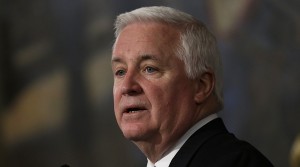Pundits, critics worry Corbett’s budget delays tough decisions

By Andrew Staub | PA Independent
Somehow, Pennsylvania’s projected $1.4-billion deficit disappeared this week when Gov. Tom Corbett revealed a budget that marks a 3.3 percent increase in spending from the current year.
Facing stiff re-election odds, Corbett did it without raising taxes, while continuing to phase out the capital stock and franchise tax. It almost didn’t make sense how the dire fiscal projections turned so swiftly.
“All sorts of weird things happen in election years,” said Antony Davies, an professor of economics at Pittsburgh’s Duquesne University. “The game becomes very much one of appearances rather than reality.”
So what’s the reality of Corbett’s $29.4 billion budget proposal?
TROUBLE COMING: Pundits and critics contend Gov. Tom Corbett’s latest budget might leave a mess for taxpayers in the near future.
While pouring $387 million more into education, it relies in part on several one-time revenue streams, deferring pension costs and an optimistic outlook that an improving economy will pull more tax revenue into state coffers.
While Jay Pagni, Corbett’s press secretary, said one-time revenue sources were used “judiciously,” Davies, Democratic lawmakers and policy wonks painted it as a risky and possibly unsustainable plan that could wreak havoc for taxpayers in the near future.
“One-time fixes are dangerous, and they’re dangerous because they only kick the can down the road,” Davies said. “It’s like a household not being able to meet ends meet, so they sell their car so they can buy food. Well, that buys you food for this year, but what you going to do next year?”
The Democratic House Appropriations Committee contended Corbett wants to use $1.2 billion of
“unsustainable or unpredictable funding sources, program cuts or other gimmicks” to make ends meet.
Among them, the committee cited $225 million of tobacco settlement funds devoted to pension costs; a one-time $150 million boost from revamped unclaimed property laws; and another $125 million in savings should the federal government grant Pennsylvania a waiver from Medicaid expansion — by no means a done deal.
Democrats also said deferring pension payments will increase the state’s unfunded liability by $13 million over three decades.
“Whether it’s him or whether it’s another governor, certainly the Legislature will have to deal with these compounded problems,” said House Appropriations Minority Chairman Joe Markosek, D-Allegheny.
Davies said he foresees tax hikes necessary for the state to sustain or increase spending levels, with lawmakers claiming they have no choice. In reality, they’ll be making the call this year if they look to one-time revenue streams to balance the budget, Davies said.
Pagni countered that while Corbett wants to net short-term pension savings, he wants to pair that with long-term pension reform that will bring more savings and ensure “we are not kicking the can down the road, so to speak.”
Increased taxes might also be avoided, Pagni said.
“There are still options out there that could be employed if necessary before going back to the families of Pennsylvania and raising taxes,” he said, though he did not elaborate.
While Corbett presented a feel-good budget proposal, the months leading up to his speech seemingly brought only bad fiscal news.
Last month, the state’s Independent Fiscal Office predicted the state will finish this budget year $150 million below expectations. In December, Budget Secretary Charles Zogby projected a $1.4 billion deficit. And in November, the IFO warned of a long-term structural deficit that could leave Pennsylvania with a shortfall of more than $2 billion by 2018-19.
That report estimated revenue below what Corbett will count on next year, but IFO Director Matthew Knittel pointed out that those figures didn’t include funding streams from recently legalized small games of chance and some of the non-recurring revenue sources Corbett wants to tap.
While Davies said he isn’t so sure, Knittel said he believes the administration’s hope that an improving economy lines up with current forecasts.
There’s still skepticism.
Michael Wood, research director at the Pennsylvania Budget and Policy Center, said that further reducing the capital stock and franchise tax will put more pressure on higher growth of the personal income tax and sales tax, two areas the administration hopes will fuel the budget.
For now, it seems a budget designed to avoid making citizens angry will leave the tough decisions to whoever handles the next budget proposal, Wood said.
“This is something that the state’s done before,” he said, “and it just makes it that much more difficult to come up with a reasonable spending plan the next year.”
Andrew Staub is a reporter for PA Independent and can be reached at Andrew@PAIndependent.com. Follow @PAIndependent on Twitter for more.
The post Pundits, critics worry Corbett’s budget delays tough decisions appeared first on Watchdog.org.







